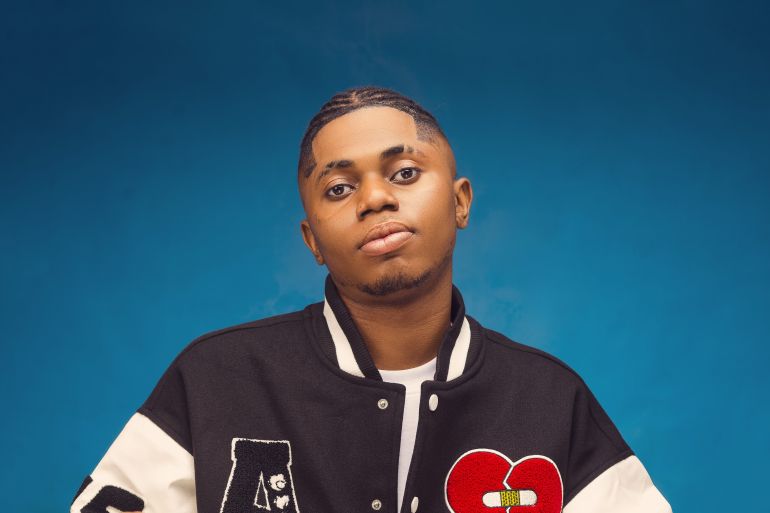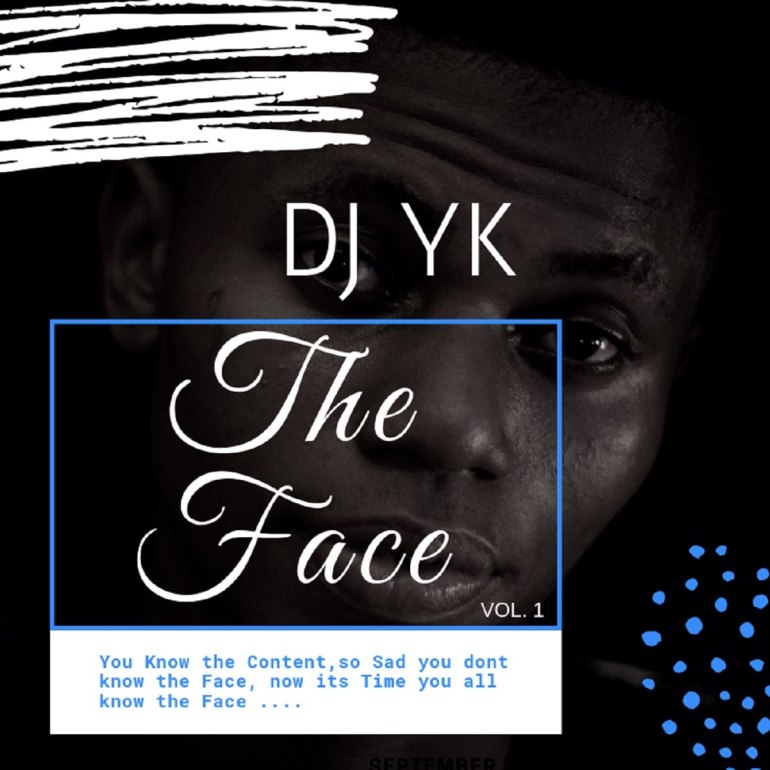The reclusive TikTok star powering Nigeria’s street Afrobeats scene
On social media, DJ YK’s influence is ubiquitous – the hashtags #DJYK and #DJYKbeats have over 14 million streams and 50.5 million streams respectively on TikTok.

Lagos, Nigeria – In 2019, a catchy, melodic instrumental hit social media platforms in Nigeria. A year later, it emerged as a groovy soundtrack during lockdowns induced by the COVID-19 pandemic, and afterwards on dancefloors, across parts of Africa and the African diaspora.
Simply titled Dance, the beat had no vocals. It indisputably bore the marks of Nigeria’s blossoming Afrobeats music genre but an overwhelming majority of those who liked it had no idea who its producer was – until November 2019 when its creator, Lagos-based Olayinka “DJ YK” Lawal, uploaded a street dance video for it on YouTube.
The virality was evidence of the enigma of 29-year-old Lawal, a relatively unknown act in the mainstream Nigerian music industry but one with a massive presence on Instagram and TikTok. He also has a large following in the street music scene across Lagos, the continent’s de facto entertainment capital.
That provided a springboard for the untitled beat to conquer the continent, but Lawal has largely stayed away from the limelight. “I am not the interview type,” he told Al Jazeera, calmly at the start of a chat after weeks of ducking phone calls and not replying to text messages.
Last summer, Essence, a song by Nigerian superstar duo Wizkid and Tems, peaked at the ninth spot on the Billboard Hot 100 chart and Love Nwantiti by their compatriot cKay became the most Shazamed song in the world. Those moments, alongside the 2021 Global Music Album category win at the Grammys by another Nigerian, Burna Boy, are seen as seminal landmarks of Afrobeats and its arrival on the global scene.
According to Statista, the revenue of the Nigerian music industry will be approximately $44m in 2023, a sharp rise from $34m in 2018 due to the global acceptance of Afrobeats. Major international players like Universal, Sony and Empire have set up shop in Nigeria.
But the ground zero of the genre, a loose grouping of contemporary African pop sounds from mostly Nigeria and Ghana, is in the inner streets of the many ghetto communities dotting Lagos.
And if Afrobeats is scrubbed of its Western-approved sheen, Lawal is one of its powerful engines. His producer tag – “DJ YK Mule” (‘mu le’ is a Yoruba phrase which means ‘drop it’) reverberates across Lagos alongside his catchy beats, powering many a faaji – the Yoruba concept of enjoyment as a part of everyday living.
On social media, DJ YK’s influence is ubiquitous – the hashtags #DJYK and #DJYKbeats have at least 14 million streams and 50.5 million streams respectively on TikTok. On Instagram, he has an average of 50,000 views on his reels.
His beats have become the soundtrack to viral challenges on both platforms and YouTube. Popstars Naira Marley and Ice Prince have also given him shout-outs on social media for his influence on today’s sound.
A method to the madness
But he is an unconventional pop star with unusual problems: his music gets no love from many radio stations and his face barely registers on the scale of known faces in Nigerian pop culture, even to many who dance to his music.
“I know people wonder what DJ YK looks like,” he said.
While other music celebrities post clips of their performances on their social media pages, DJ YK prefers to share viral videos featuring his instrumentals.
But his reclusive nature has also affected his brand value. While newbies are racking up endorsements, DJ YK has yet to bag a major endorsement deal.
“He is one of those old-school producers that are content with having a hit song and being a DJ,” Motolani Alake, Nigerian music critic and Lagos-based managing editor of Pulse Nigeria daily magazine, told Al Jazeera. “Maybe he is scared of the public, that’s a possibility.”
Music critics say his reclusive behaviour is not reverse psychology to boost attention to his brand but simply the case of a private individual shunning the press.
During the interview, his answers were direct and brief. He also nitpicked questions to answer, not with the arrogance of a megastar, but with the impatience of one keen to return to focusing on doing what he loves best – making people dance.
Born and bred in Sango-Ota in Ogun state, next door to Lagos, Lawal always liked music.
He evaded questions about his family and background, preferring to discuss only music. But he revealed that he grew up poor. “Everything was rough,” he said. “I came from a poor background. I had no supporters,” he said.
Born a Muslim, he still holds on to his faith today and studied at what is today known as the Tai Solarin University of Education in Ogun state.
As a teenager, he began to listen deeply to stars at the time like Terry G, SideOne, DreSan and others who took over the inner-city of Lagos and its environs.
The music from these artists was crude and vulgar but represented the sound of the inner-city youth. Its tempo was also fast and the songs had an unconventional structure, which was partly why most of the musicians did not hit mainstream stardom.
And Lawal gravitated toward this sound in his environment.
His foray into music began around 2013 when he started as a disc jockey but he was not raking in good money from deejaying. During those dark times, Lawal decided to try his hands at production.
“I learned everything I know about music on YouTube,” he said. “Music production is how people knew about me,” he said. ‘When you have been doing something for a while, and people are not turning up, you have to sit down and find the way forward and make yourself popular.”
With production in his repertoire, Lawal’s career began an upward trajectory. He credits the viral instrumental he released in 2017, South African Beat Style, as when things started to pop for him. It was during this period that he performed at concerts headlined by Afrobeats stars Mayorkun, Mr Eazi and Reekado Banks.
That instrumental was later rechristened Dance when it started to get mainstream attention. And when he officially released it in 2019, it moved from barbershops in inner-city Lagos to many of the most exclusive nightclubs across Nigeria.
Its popularity coincided with the emergence of a new dance wave accompanying the introduction of Afrobeats to global audiences. Dance steps Shaku Shaku, and Zanku became part of popular culture and became the perfect platform for DJs like Lawal to flood the scene with their instrumentals.
Lawal’s other beats initially followed the same pattern as Dance, not requiring a singer or rapper to jump on them. It takes him anything from 2-10 hours to produce them, or sometimes two days.
They sound crude but are a tour de force sans vocals and quick to induce sweat and euphoria, thanks to a nifty undercurrent that is hard to resist, his fans say. And perhaps another reason the beats catch on so well, critics say, is because they are also reminiscent of popular street musicians.
One of those is Terry G, a veteran singer, producer and hood genius who blew up circa 2008, thanks to a staccato flow and similarly groovy songs.
“I feel it is Nigeria’s version of EDM, rave music, and dubstep,” Alake said.
After making a name for himself in the underground scene, Lawal was not satisfied with being a one-trick pony. In 2020, he add a new element to his beats, viral vocal gaffes or buzzwords. He would splice the buzzwords and embed them in his instrumentals.
“Essentially my beats became songs,” he said. The new style worked tremendously and elevated his profile more. Today, most DJ sets across Lagos are incomplete without Warisi and Trap Lanje, two of his biggest songs.
Unmasking the enigma
But virality has its drawbacks.
According to City 105.1 FM Lagos presenter Melody Hassan, “People assume that everything that goes viral on TikTok automatically gets played on the radio. It’s not necessarily so.”
Each radio station has its music style, and DJ YK’s beats are barely radio-friendly. Even with a bias for Nigerian songs on the channels, most stations hardly play “street music”; when they do, marquee artists like Naira Marley or Zlatan get the slot.
“His songs [also] don’t work in radio format because of the sparse vocals and prolonged instrumental,” Hassan told Al Jazeera.
Still, many mainstream acts would gladly pay handsomely to get his level of cultural relevance. But Lawal says he only posts his songs online and does no other form of promotion. And he credits the new generation of dancers with helping promote his music.
Unsurprisingly, his influence is now increasingly cutting across economic strata. Unlike a few years ago, it is now common to witness bedlam at a street carnival in the low-income suburbs of Agege or concerts in the highbrow district of Victoria Island, when a DJ YK beat comes up. People become “possessed” as they shuffle their legs in a wide range of dance moves popularly known as “legwork”.
“His work is a unifier,” Alake said. “It’s the energy that the streets enjoy. It’s infectious and unique.”
Even without little or no radio play, Lawal is happy about his impact. But if there is any clear grand plan or master strategy to push himself further, he is being cryptic about it, as usual.
His only body of work is the 2019 album, The Face, Vol. 1, and he is tight-lipped about whether another project is on the way.
The Face had nine tracks and no features. Apart from two acts – Dammy Krane and Q-Dot – Lawal has not worked with any artiste of repute in a strictly collaborative sense. He prefers to slice catchphrases from popular artists and sample them on his beats.

But even the enigma may be tired of lurking in the shadows and Lawal is working on new music videos that he could star in – and that could unmask him. But he seems prepared, willing even.
On his album cover lies what is perhaps a prophecy for the days ahead. “You know the content, so sad you don’t know the face, now it’s time you all know the face,” it reads.